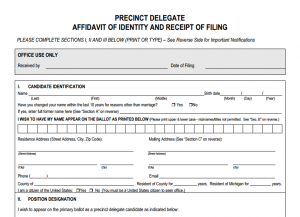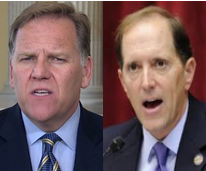Antrim County Republican Party Meeting’s Minutes
Monday, March 17, 2014 Forest Home Twp. Hall
7:32 p.m. Meeting called to order by Chairman – Randy Bishop, Prayer led by Jim Gurr
Pledge of Allegiance, Introduction of Executive Committee Members.
Approval of January 20th, ACRP Meeting Minutes:
Motion to approve – Jim Gurr: 2nd. by Dr. Richard Hoadley. Approved without objection.
Treasurer’s Report – Laura Bogdan: Corporate Account: $xxxx.xx
State Account: $xxxx.xx
Announcement of Vice Chair – Lori Luckett’s resignation as of 2/25/2014.
Randy Bishop made motions to make; Laura Bogdan – Vice Chair (2nd Betsy Aargo,)
and Tom Sommerfeldt – Treasurer; (2nd Brad Brown).
Motions passed unanimously by the paid members who voted.
Chairman’s Report – Randy Bishop, announced goal of increasing ACRP membership to 100 paid members. Asked members to each recruit three new members. Stressed importance of getting Terri Lynn Land, elected to the U.S. Senate. Land polling ahead of Gary Peters in last five polls, two were conducted by the Dems.
By increasing and educating members, we need to encourage people to run for Precinct Delegate. Must file with Antrim County Clerk, by May 6th. deadline. As Chairman of ACRP, Randy has prepared the Apportionment Plan for Antrim County, to be submitted to the County Clerk and State MRP.
After Precinct Delegates are elected, ACRP will hold a training session. Number of delegate positions by township: Banks Twp. gets 7, Central Lake 8, Chestonia 2, Custer 5, Echo 3, Elk Rapids 11, Forest Home 8, Helena 4, Jordan 3, Kearny 7, Mancelona Precinct One 5, Mancelona Precinct two 4, Milton 10, Star 3, Torch Lake 6, Warner 2. Delegate positions have never been filled. Goal is to have all 88 delegate positions filled this year. Currently we have 24.
Jim Gurr: Explained who delegates nominate at our state party conventions.
The MRP has taken Obama’s technology and improved it. New website migop.org provides access to activities, meetings, Dash Board, to Get Out The Vote. Will be able to access the names of every Republican, registered to vote in your precinct. Plan for Delegates to be at their polling places on election day, call to remind those registered to vote and check off their names when they vote.
We have been assured that this general election, we will have yard signs and handouts in advance, for our candidates. Demonstration of Dash Board at migop.org
Brad Brown is again Chairman of July 19th. “ACRP Fun – Day/Golf outing. RSVP’s from a lot of candidates. Lt. Gov. Calley, Congressman Benishek and local candidates, will be attending. Due to candidates speaking, motorcycle and airplane rides are canceled. Ticket prices: $25. for buffet. $75. for Golf, including buffet. Proceeds go to our State Campaign account. To register for this event go to ACRP website at acrpmi.org and click on ‘Future Events’ .
To read bylaws, go to our ACRP website at; acrpmi.org and then click on the ‘About Us’ tab.
To receive ACRP Newsletter and e-mail updates, type in your e-mail address or a friends, in the ‘Subscribe’ space, and a confirmation e-mail will be sent, or to become a member, click ‘Join Us’.
Next GOP State Committee Meeting will be held in Antrim County, at Shanty Creek Resort on May 2nd and 3rd. Laura Bogdan in charge of gift bags for committee members. ACRP members are asked to dress in red ACRP shirts and blue jeans, to greet attendees at the Friday evening, ‘Pizza and Politics’ gathering, on the 2nd. No one recalls State Committee ever meeting in Antrim County. Explanation was given on how the State Committee functions.
Tom Stillings: Invitation to Attorney Gen. Bill Schutte Bar-B-Q at Howard Walkers home on June 17th. 5:30 -7:30 p.m. tickets $ 50. for your entire family. Buy on line at Schutte’s web site or from Tom.
Ruth Report on line 130,000 dead people removed from voter reg. rolls. Goal is 200,000.
Discussion on the Elk Rapids, ballot proposal was held. Chairman Randy Bishop reported,: Nothing is stated in the ACRP bylaws regarding nonpartisan, or ballot issues. The National Republican Party Platform, which is also our state’s platform, says “we stand for limited government and less taxation.” This was a tax issue! Chairman believes, “the reason we are losing elections, is because we are becoming more like the Democrats.” The proposal originally defeated by 12 votes in the previous general election. When the information on the ‘special election’ got out to Republicans, it was defeated by 300 votes in the special election.
He assured those present, that future upcoming elections and ballot proposals, will be “clearly stated” on the agenda, and a vote of the membership will be taken, before the party takes a position on an issue and make a public recommendation. He stressed the fact that it is our obligation to educate and inform our members, and that “the ACRP, will stand strong on our principles and on our Republican National Party’s Platform.”
Tom Stillings reviewed the proper way of filling out Part Time Legislature petitions. Most common error is writing down birth date, instead of date of signing. Only after last signature on petition is signed, may a circulator fill in the information required at the bottom of the petition.
Antrim County Commissioner Ed Boetcher, spoke on his efforts to save money spent on postage in mailing out hundreds of pages to each commissioner, by electronically transferring from a web site onto a screen, for easy reference during meetings and to provide the public with information on upcoming issues prior to commission meetings over the internet.
Jim Gurr: Motion to adjourn 2nd: Richard Hoadley
Meeting Adjourned at 9:08 pm.






